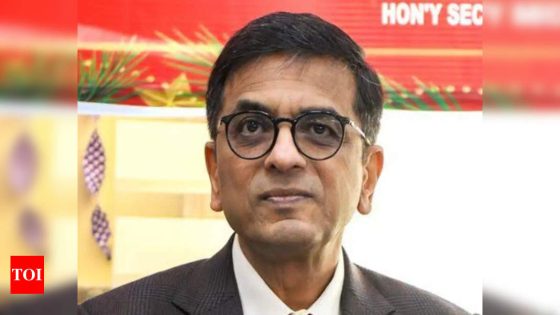NEW DELHI: In a compelling address at the East Zone II Regional Conference of the National Judicial Academy, Chief Justice of India (CJI) D Y Chandrachud underscored the critical importance of ‘Constitutional Morality‘ in Indian jurisprudence. The CJI highlighted the judiciary‘s commitment to diversity, inclusion, and tolerance during the inaugural session of the two-day event.
CJI Chandrachud elaborated on the concept of ‘Constitutional Morality,’ emphasizing it as a fundamental restraint on state power derived from the Preamble’s values. He asserted that India’s federal structure, marked by significant diversity, necessitates a judicial role in preserving this pluralism.
“I am reticent when people call courts a temple of justice because that would mean the judges are deities which they are not. They are instead servers of the people, who deliver justice with compassion and empathy,” CJI Chandrachud said as quoted by PTI.
The conference, titled ‘Contemporary Judicial Developments and Strengthening Justice Through Law and Technology,’ also provided a platform for discussing the integration of technological advancements in the justice delivery system.
The CJI cautioned against the judiciary allowing personal values and beliefs to influence judgments contrary to constitutional values. “We could be masters of Constitutional interpretation, but a just society is established with the court’s vision of Constitutional Morality,” he said.
In his speech, CJI Chandrachud highlighted the need for technological innovations to enhance the justice delivery system, not merely for modernization’s sake but to achieve broader objectives. He mentioned AI-assisted software under development to translate the 37,000 Supreme Court judgments from English into all constitutionally recognized regional languages. This initiative aims to make legal resources more accessible.
Furthermore, the CJI outlined other technology-driven measures to improve judicial efficiency, such as digitizing Supreme Court judgments, decentralizing court access to reduce travel burdens on litigants, increasing public awareness of court procedures, and categorizing cases effectively.
West Bengal chief minister Mamata Banerjee, delivering a special address at the conference, appealed to the judiciary to remain free from political bias. “Judiciary should be pure, honest, and sacred. I believe that the judiciary is of, by, and for the people. If the judiciary cannot deliver justice to people, who can? It’s the ultimate frontier for getting justice and the last recourse to save our country’s democracy and our Constitution,” Banerjee said.
Chief Justice of Calcutta high court TS Sivagnanam also attended the conference, which was organized in collaboration with the Calcutta High Court and the West Bengal Judicial Academy.
CJI Chandrachud elaborated on the concept of ‘Constitutional Morality,’ emphasizing it as a fundamental restraint on state power derived from the Preamble’s values. He asserted that India’s federal structure, marked by significant diversity, necessitates a judicial role in preserving this pluralism.
“I am reticent when people call courts a temple of justice because that would mean the judges are deities which they are not. They are instead servers of the people, who deliver justice with compassion and empathy,” CJI Chandrachud said as quoted by PTI.
The conference, titled ‘Contemporary Judicial Developments and Strengthening Justice Through Law and Technology,’ also provided a platform for discussing the integration of technological advancements in the justice delivery system.
The CJI cautioned against the judiciary allowing personal values and beliefs to influence judgments contrary to constitutional values. “We could be masters of Constitutional interpretation, but a just society is established with the court’s vision of Constitutional Morality,” he said.
In his speech, CJI Chandrachud highlighted the need for technological innovations to enhance the justice delivery system, not merely for modernization’s sake but to achieve broader objectives. He mentioned AI-assisted software under development to translate the 37,000 Supreme Court judgments from English into all constitutionally recognized regional languages. This initiative aims to make legal resources more accessible.
Furthermore, the CJI outlined other technology-driven measures to improve judicial efficiency, such as digitizing Supreme Court judgments, decentralizing court access to reduce travel burdens on litigants, increasing public awareness of court procedures, and categorizing cases effectively.
West Bengal chief minister Mamata Banerjee, delivering a special address at the conference, appealed to the judiciary to remain free from political bias. “Judiciary should be pure, honest, and sacred. I believe that the judiciary is of, by, and for the people. If the judiciary cannot deliver justice to people, who can? It’s the ultimate frontier for getting justice and the last recourse to save our country’s democracy and our Constitution,” Banerjee said.
Chief Justice of Calcutta high court TS Sivagnanam also attended the conference, which was organized in collaboration with the Calcutta High Court and the West Bengal Judicial Academy.
Source Agencies



